Friday, 21 August 1998
Songpan, Sichuan, China
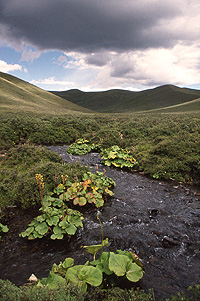
(Aba Grasslands, Sichuan, China)
After our driver from Langmusi failed to turn up we had some luck and one of the English teachers managed to arrange for us to travel for the going rate in another vehicle. The journey was brilliant. Not only was the scenery spectacular: mountains, then endless flat grasslands then a drop into the lush green valleys of Sichuan. But also the driver was friendly and he had bought his baby daughter who amused us endlessly. One minor problem was that we were travelling in the cabin of a pick-up and on two occasions people jumped in the back and effectively got a free ride to the next town. Just before Songpan it was more sinister because we were slowed down by people jumping out in front of the jeep whilst their friends hopped on to the back. Even the driver was annoyed by this, however in a place with such poor transport hitching is very much part of the way of life.
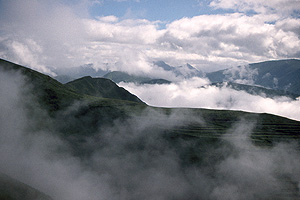
(Songpan, Sichuan, China)
Our arrival in Songpan was a little bit like arriving in a different country. For the first time we saw family houses built of wood and very few of the concrete monsters that had dominated nearly every town we had visited in Gansu. We found a hotel, arranged horse trekking for the next day and had a meal so spicy that even I failed to finish it.
Saturday, 22 August 1998
Songpan, Sichuan, China
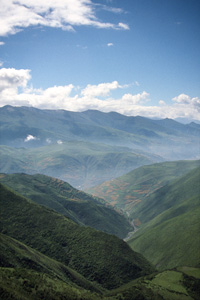
(Songpan, Sichuan, China)
Day one of the horse trek and Anna's birthday. We woke up and went to the office of "Mike" where we found fifteen horses waiting in the street. As we had been led to expect you even have to fill in a temporary residence card for camping - someone had told us that this information goes into computers, so I guess the government track you wherever you go. I managed to get on my horse without too many problems and pretty soon we were heading up a steep path into the clouds.
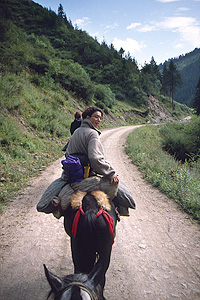
(Songpan, Sichuan, China)
The view from the mountains over Songpan was spectacular, a landscape of green with square yellow patches of wheat enhanced by clouds drifting in and out below us. After crossing a mountain path we had to get off the horses and walked down to the road which led to the Er Duo lakes. This sight was a little disappointing, a series of crystal clear lakes with a not very hot, hot spring at the top. Some of the bits of the walk, tightly controlled by a duck board path, were interesting, especially where the walkway would cut right across the middle of one of the lakes, sometimes slightly submerged under the surface of the water.
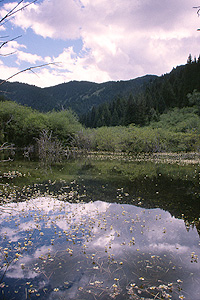
(Songpan, Sichuan, China)
When we arrived at the hot spring a group of Chinese were in a hut above one of the warmer springs. They screamed and shouted so much that when they finally left a group of us went in, stuck our feet in the water and screeched in imitation for ten minutes. After we got back we sat by the river for half an hour with a couple of beers to celebrate Anna's birthday, had some dinner then got well and truly drunk by the side of a huge fire they lit.
Sunday, 23 August 1998
Songpan, Sichuan, China
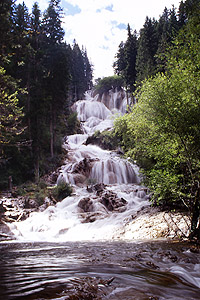
(Songpan, Sichuan, China)
Waking up we found that we were definitely saddle sore. We had breakfast then got on our horses. We then had a three hour ride through some beautiful countryside and scenic villages to a park containing Zhaga Waterfall. In the park we set up camp next to an old pavilion overlooking the river valley. We then walked to the waterfall which was, and I'm running out of adjectives here, absolutely stunning. Rather than just one main chute the river splits over rounded rocks and between some of the splits trees grew. The duck boards were placed in some spectacular places including one that traversed the main section about halfway up. The wind and spray hit us with force and sections of the duck board had been washed away. We also spotted some caves underneath the falls and even a walkway that used to go through the water into one of them, this however had been totally wasted.
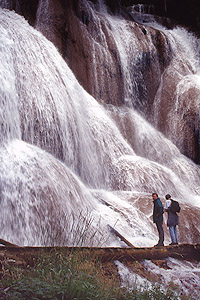
(Songpan, Sichuan, China)
We walked for hours by the side of the waterfall and when the boards ran out we even carried on along the horse track. The surrounding park was very nice with hundreds of mushrooms, our first sighting of bamboo groves and some weird lichen that hung from the trees like cobwebs. When we went of the track for a while the vegetation got wilder and wilder and some of the trees seemed like they had been untouched for hundreds of years. The other nice thing was that we were pretty much the only people there.
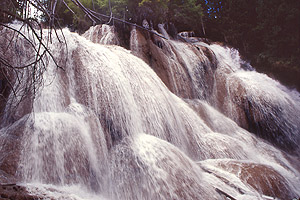
(Songpan, Sichuan, China)
That night things were a bit quieter. Most of the party had split off to go on a longer four day tour so there were five not twelve people for dinner. The guides cooked an amazing quantity of stew, which contained locally collected mushrooms and we failed to finish it all. We chatted until not too late around a fire built inside the pavilion.
Monday, 24 August 1998
Songpan, Sichuan, China
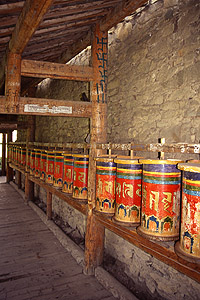
(Songpan, Sichuan, China)
I woke up on day three of the trek even sorer. Our decision to wash down by the side of the river, about fifty metres below the pavilion was rewarded by the discovery that it was just as beautiful all along its course. The river bed was like a series of scales, with water dropping from one section to another. Again trees grew in the river and the path by the side was overgrown by all sorts of plants.
After breakfast we got going and quickly reached Zhaga monastery, which was a little lacklustre with only a small square of prayer wheels, despite the fact that the entire perimeter "wall" had been lined with them at some time in the past (presumably pre-cultural revolution). One thing that was interesting were the swastikas daubed on the wooden beams. Apparently the swastika is an important Buddhist symbol that was in use long before the rise of the Nazis. Then it was up the road to a second mountain pass and our return to Songpan.
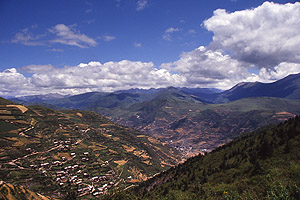
(Songpan, Sichuan, China)
Back at the office of the horse trekking company our group made a bit of trouble for one of the guides. We had collected all our rubbish from the previous night, mineral water bottles, coke cans etc. in a bag with the intention of disposing of it in a village. Sadly the guide never tied it to a horse and instead just threw it into the bushes. We were a little upset about it but they told us that there were people employed to pick up and burn the rubbish periodically. This was hardly the point and just went to show us how little the Chinese feel about the environment. However apart from the campsites the park had been relatively free of rubbish so there may have been some truth to what they were saying.
Tuesday, 25 August 1998
Chengdu, Sichuan, China
A very early morning (0500) departure was not exactly what the doctor ordered but at least it would get us to Chengdu at a reasonable time. The scenery would have been beautiful on the journey if it wasn't for the pollution. We were very close to the cloud cover in the valley, I'm sure we were between 2000-3000m for the whole journey, and this kept the smoke from a variety of factories along the Min River contained within a very narrow "tube". After eight hours of wishing that the fog would lift the road opened out onto a plain and after two hours of satellite towns we finally got to the bus station. After this someone found a small van to take the five interested parties to the Traffic Hotel - the one recommended in our books and we set off through the rush hour.
The Traffic Hotel was a prime example of how self defeating budget guide books can be. In the two years since both the Rough Guide and the Lonely Planet had recommended it had used the money it earned to give itself a face lift and an equal price lift. One of the girls in our taxi had been here years before and remarked how where previously the hotel's neighbours had been lines of wooden houses they were now high-rise buildings. This was pretty much endemic in Chengdu. Although you could still see two story wooden fronted shops in a few places you would most commonly see them behind a constructor's wooden fence topped with an artist's rendering of what the replacement appartment block would look like in a couple of months.
After we had checked in to our quite expensive but much deserved room we went out onto the town to have a delayed birthday meal for Anna. We had chicken with chilies and wild peppers and twice cooked pork. I had heard a lot about Sichuanese cooking and although we paid a lot for it I was in no doubt that it was the best meal of our trip so far.
Wednesday, 26 August 1998
Chengdu, Sichuan, China
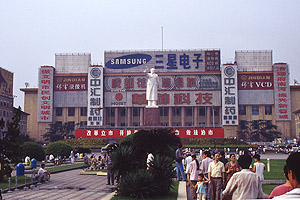
(Chengdu, Sichuan, China)
A day spent in a rainy Chengdu . The morning was consumed in our hotel room where I had the first bath, as opposed to shower, of our trip. Then we went to try and retrieve a letter from Poste Restante, which had moved half way across town, and get an onwards train ticket. The latter proved to be more of a problem as we were informed that we could not book a train more than a day in advance - something that I found hard to believe since trains in China are always heavily booked up, but which turned out to be partially true, you had to go to another office in town.
After this we went to visit a fake "Chinatown" road where all the buildings had been rebuilt in a romanticised Qing style and housed jewelers and restaurants. We then found a tea house in a pavilion that looked rather more authentic with its floors of card-playing businessmen, courting couples and erudite old men. Sadly here too the hand of tourism had been at play, they asked us 3.50 each for tea and when we gave them 10 they disappeared and never came back. I then went and argued with them and found that, supposedly due to inflation, the price was 5. They did not help themselves too much by pointing to something on their menu for five that was not tea whereas the tea options were clearly labelled, in Pinyin and Chinese characters as being either 2 or 3.
After this we visited Baihuatan Park which despite having an amazing collection of Bonsai looked like it had seen better days. Then we walked back to the town centre past some preserved tourist streets and a few more blocks of wooden houses earmarked for destruction, had dinner then went to sleep.
Thursday, 27 August 1998
Leshan, Sichuan, China
The day was punctuated by three attempts to cheat us. Attempt number one was a cycle-rickshaw driver who we wanted to drive us from the offices of the CITS (where we had finally managed to buy our onward train tickets) to the Bank of China. He showed us two fingers when asked how much it would cost and once we thought it was too little we tried to clarify the situation with "liang kwai, liangger" which very roughly means two Yuan for two. To this he nodded then set off and when we arrived at our destination we presented him with two Yuan notes at which he shook his head and produced a ten Yuan note as if to suggest the agreed price was twenty. This however had happened to us before, if the rickshaw driver cannot take you without agreeing a price first they try to confuse tourists with the "I meant twenty when I stuck two fingers in the air routine". Sadly it did not work with us because for one thing "liang" is only ever used for counting two, it seems to be equivalent to the English couple, and could never mean twenty which is "ershi". Secondly after he started the argument the crowd that gathered were on our side and he soon gave up.
The second attempt to cheat us, was not so clear and came in the bus station. We had decided to go to Leshan that afternoon, stay the night and come back the next day. We bought our tickets and boarded what we thought was the 1300 minibus and the driver confirmed this after studying our tickets. The bus finally started to leave at half past but as it was coming out of the station we were pulled off the minibus and put on a 1400 coach. We found out later that there were minibuses plying the route for half the price but we could never be sure whether we had been booked on the 1400 and been misinformed or we had paid the price for the coach and been pushed towards the minibus only to be rescued by more scrupulous station staff.
After we had arrived at Leshan, booked into a hotel and explored the waterfront attempt number three came. In China you always, always have to know the price of things before ordering in a restaurant. At the restaurant we ate in the prices of the dishes were clearly shown on the menu, what they conveniently neglected to tell us was the price of the beer. We drank three bottles and when the bill came it showed each beer was ten yuan, double what any restaurant would normally charge you and three times what it would cost you to buy. However this had been done to us before and so we decided to put up a bit of a fight. After many a "this cost Wu Yuan in Chengdu" the waitress disappeared and produced two bottles of beer. One he said was normal Chengdu beer, the other - identical with the exception of a foil cuff, was a new premium beer. Okay we said, but how could it ever cost ten? It would have to be at least equivalent to Stella Artois before we would even consider paying ten and their beer tasted like all the other piss that everyone served for three. At this point the waitress revealed that there had been a mistake, the premium beer was eight not ten, our bill had been reduced accordingly. We decided to pay at the reduced level rather than keep on bickering...
Friday, 28 August 1998
Chengdu, Sichuan, China
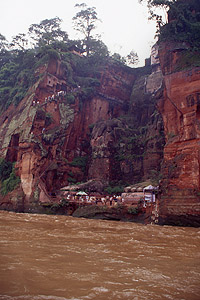
(Chengdu, Sichuan, China)
Leshan is one of those tourist sites which like the Eiffel Tower or the Terra Cotta Army has to be seen because no photo can convey its true scale. So we dutifully set off on the ferry at 0930, crossing to the first of two islands. This island was topped by the small Wuyou Si monastery which was relatively tourist free and full of grotesque carvings. The gardens surrounding it were, unlike most of what we had seen so far, distinctly un-European. Both islands were overgrown with bamboo stands, palm trees, creepers and gnarled trees.
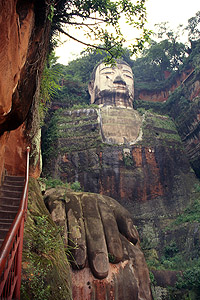
(Chengdu, Sichuan, China)
Across a bridge the second island was home to Dafo, the Great Buddha, which at 71m is the world's largest Buddha. It was carved into the sandstone cliffs by the monk Haitong in 713 AD in an attempt to protect travellers navigating the confluence of the Qingyi, Min and Dadu rivers below. We huffed and puffed our way up and down the cliff path, a route which takes you around the side of the island through twisting rock passages to emerge by the Buddha's left ankle. Of course when you first enter the daylight you do not realise that the 8m slab of rock facing you is its foot, however you then notice the carved ridge of its toenail and so you raise your head and finally realise its scale. From the bottom it looks a little out of proportion but as you ascend the staircase of nine turns you get level with its knees and the incredible detail becomes clear, the curls of its hair, the folds of its robes and the plants growing out from between its fingernails.
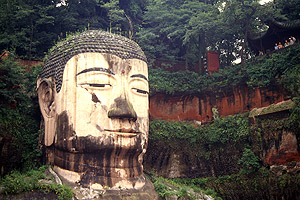
(Chengdu, Sichuan, China)
We left pretty soon after seeing the Buddha which was a shame because it seemed that the whole island was teeming with sculpture, hacked into niches barely free of the vegetation falling all around. Just before the exit there was a stream which drained through a carved dragons head into a pool and the beauty of this really made me feel that the site deserved at least another hour. However time, and more pertinently the fact that it was incredibly humid meant that we had to miss out the rest of the island and head back to Chengdu.
Saturday, 29 August 1998
Dukou, Sichuan, China
Morning was consumed by a shopping trip. Shopping in Chengdu is not too unlike shopping anywhere else, one of the department stores we went into would have been hard to tell from your average House of Fraser were it not for signs in Chinese. In fact here we were able to procure our first nice, and not out-of-date, chocolate - a bag of Cadbury's chocolate eclairs. Then it was onto a hard sleeper bound for Dukou on the border with Yunnan.
Sunday, 30 August 1998
Lijiang, Yunnan, China
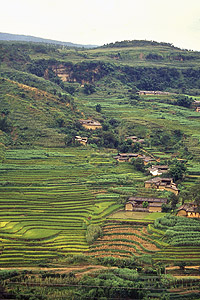
(Lijiang, Yunnan, China)
We went to sleep watching the vast cultivated plains south of Chengdu and woke up in a landscape of mountains and tunnels. It is said that there are over 200 tunnels on the Chengdu-Kunming railway line and from what we saw this must be true. You would come out of a tunnel, get a tantalizing glimpse of some valley then you would be straight back into the next tunnel. I guess its one of those feats of civil engineering which the Chinese and Communism thrive on.
Our arrival in Panzhihua , the rail head for Dukou, at 0915 was followed by the good news that there was a bus to Lijiang waiting in the station for us. We got on it and then realised that it was also waiting for the next train an hour later and even then was not fated to leave until 1045 because of a bureaucratic hold-up. Even then the way was not smooth, the bus driver decided to move all the luggage from inside the bus to the roof rack to fit more passengers in, we had another argument about the amount of people in the bus which resulted in another bus being laid on, and the bus broke down about four times. After the bus really got going at 1500 the scenery was truly amazing. We have seen rice paddies before but only in Bali and never at such altitudes. The mountain valleys on our journey were literally carved into contours to house wheat fields, already on their second crop of the year. Every single bit of land was used, I even saw a small island in a river that had been sculpted into three levels exactly showing its wing shaped profile.
The bus finally got to Lijiang at 1230 and with a bit of effort we found a hotel. Fortunately Jane and Ozzie, a British couple who we had met in Langmusi, had been on the second train and had got on the same bus as us so together we got an inexpensive 4-bed dorm in an otherwise expensive, but open, hotel.




